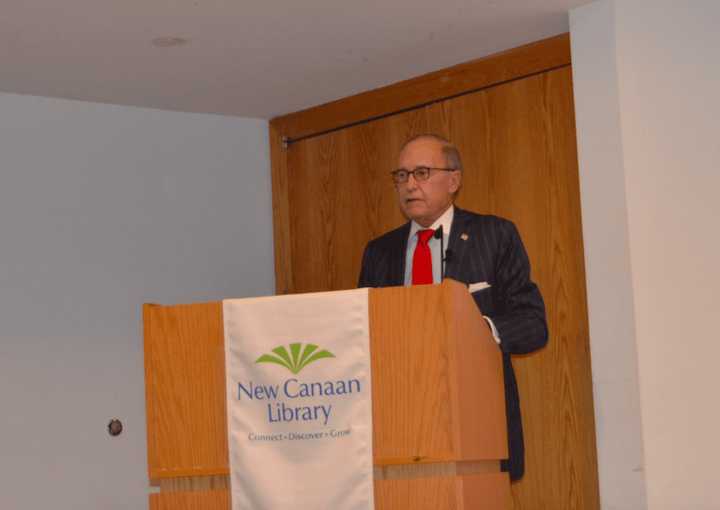At a Monday evening talk at the New Canaan Library, Redding resident Larry Kudlow, CNBC’s senior contributor and a nationally syndicated radio host, spoke about the advantages of having a reputation as a nice politician -- one who not only is bipartisan but who never feels the need to insult those who don’t share the same views.
Without saying the names "Donald Trump” or “Hillary Clinton” the entire evening, Kudlow’s message about the 2016 presidential election was crystal clear.
To demonstrate his points, Kudlow spoke about his new book “JFK and the Reagan Revolution: A Secret History of American Prosperity” to a crowd of several hundred people. He explained how both these presidents achieved success thanks to listening to the other side.
Kudlow said many people may not be aware that the first president to lower taxes across the board was John F. Kennedy. When Kennedy ran in 1960, he pledged to grow the economy at 5 percent per year. Yet, in 1961, the economy did nothing, Kudlow said.
Since the first plan didn’t work, he tried another one. “Kennedy was a pragmatic politician, a civil and respectful politician, a trait I admire.
“He had three very very distinguished Republicans in senior cabinet jobs,” Kudlow said. “One of them was Douglas Dillon, a Republican who was [President Dwight] Eisenhower’s under-secretary of state. Dillon told JFK it’s time to try something different.
Dillon advised Kennedy to lower marginal tax rates across the board for every citizen and every company, Kudlow said.
Kennedy listened and went for it. People thought he was crazy, but it worked, Kudlow said.
“The economy grew from about the middle of 1962 to the end of 1969 by about 5 percent per year,” Kudlow said.
Kudlow then spoke about Ronald Reagan, who also lowered taxes amid great controversy.
Congressman Jack Kemp, a tax cutter, sold his idea to Reagan, Kudlow said. “Kemp argued if you lower tax rates the economy will expand, revenues will come in and the deficit will actually go down.
“People thought Reagan was nuts. Yet, he won the 1980 election and gave Kennedy credit for tax cuts.
“Can you remember the last politician who did anything and gave someone else credit?” said Kudlow, to laughter from the audience. “Today, nobody gives credit. But Reagan did that."
Reagan was a civil, respectful man who never called anyone names or insulted anyone. It wasn’t in his genes, Kudlow said. “He believed in civility. So did JFK. He had to cross the aisle and persuade Republicans to be for his tax cut.
“Did Kennedy persuade them by insulting them, calling them names and disrespecting them? No. He worked with them. Can you imagine that? “ Kudlow said, over more chuckles from the audience.
Kudlow said being civil and respectful as a politician is one of his favorite themes in his new book, and he laments how different things are today.
“Because of the lousy economy, Americans have become cranky, unhappy, pessimistic and pointing fingers at groups," said Kudlow, a Republican who considered running for the U.S. Senate this fall against Democratic incumbent Richard Blumenthal.
“We need today a bipartisan tax cut and lower rates to get us out of these economic doldrums. We need the same idea as Reagan and Kennedy had. Why not try it?”
However, Kudlow said, “You can’t try it if you’re too busy calling everybody else names. Instead of persuading with facts, we are yelling and smearing.
“From the core of my beliefs, I believe this is absolutely all wrong and there is so much of it going on in politics."
Kudlow concluded his talk on a positive note. “I am here to argue that we can fix this and all you have to do is look at history and take a look at two at men who were very popular in politicians.
"This is America. It‘s the greatest country in the world. We are going through a slow patch — but it can be fixed, it can be changed.”
Click here to follow Daily Voice Trumbull-Monroe and receive free news updates.


